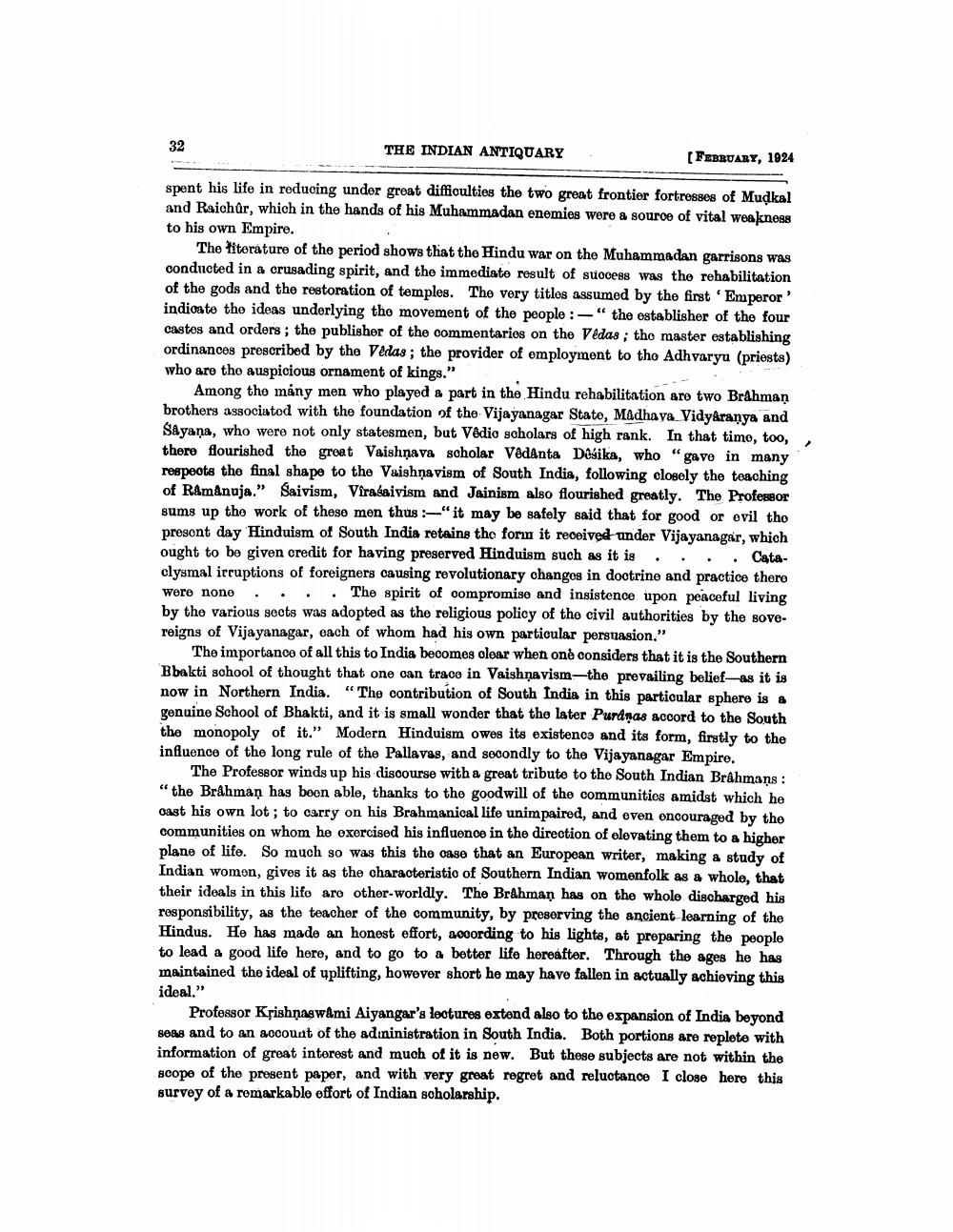________________
32
THE INDIAN ANTIQUARY
[FEBRUARY, 1924
spent his life in reducing under great difficulties the two great frontier fortresses of Mudkal and Raichur, which in the hands of his Muhammadan enemies were a source of vital weakness to his own Empire.
The literature of the period shows that the Hindu war on the Muhammadan garrisons was conducted in a crusading spirit, and the immediate result of success was the rehabilitation of the gods and the restoration of temples. The very titles assumed by the first 'Emperor' indicate the ideas underlying the movement of the people:-"the establisher of the four castes and orders; the publisher of the commentaries on the Vedas; the master establishing ordinances prescribed by the Vedas; the provider of employment to the Adhvaryu (priests) who are the auspicious ornament of kings."
Among the many men who played a part in the Hindu rehabilitation are two Brahman brothers associated with the foundation of the Vijayanagar State, Madhava Vidyaranya and Sayana, who were not only statesmen, but Vêdic scholars of high rank. In that time, too, there flourished the great Vaishnava scholar Vêdânta Dêsika, who "gave in many respects the final shape to the Vaishnavism of South India, following closely the teaching of Ramanuja." Saivism, Virasaivism and Jainism also flourished greatly. The Professor sums up the work of these men thus:-"it may be safely said that for good or evil tho presont day Hinduism of South India retains the form it received under Vijayanagar, which ought to be given credit for having preserved Hinduism such as it is Cataclysmal irruptions of foreigners causing revolutionary changes in doctrine and practice there were none . The spirit of compromise and insistence upon peaceful living by the various sects was adopted as the religious policy of the civil authorities by the sovereigns of Vijayanagar, each of whom had his own particular persuasion."
The importance of all this to India becomes clear when one considers that it is the Southern Bbakti school of thought that one can trace in Vaishnavism-the prevailing belief-as it is now in Northern India. "The contribution of South India in this particular sphere is a genuine School of Bhakti, and it is small wonder that the later Puranas accord to the South the monopoly of it." Modern Hinduism owes its existence and its form, firstly to the influence of the long rule of the Pallavas, and secondly to the Vijayanagar Empire.
The Professor winds up his discourse with a great tribute to the South Indian Brahmans: "the Brahman has been able, thanks to the goodwill of the communities amidst which he cast his own lot; to carry on his Brahmanical life unimpaired, and even encouraged by the communities on whom he exercised his influence in the direction of elevating them to a higher plane of life. So much so was this the case that an European writer, making a study of Indian women, gives it as the characteristic of Southern Indian womenfolk as a whole, that their ideals in this life are other-worldly. The Brahman has on the whole discharged his responsibility, as the teacher of the community, by preserving the ancient learning of the Hindus. He has made an honest effort, according to his lights, at preparing the people to lead a good life here, and to go to a better life hereafter. Through the ages he has maintained the ideal of uplifting, however short he may have fallen in actually achieving this ideal."
Professor Krishnaswami Aiyangar's lectures extend also to the expansion of India beyond seas and to an account of the administration in South India. Both portions are replete with information of great interest and much of it is new. But these subjects are not within the scope of the present paper, and with very great regret and reluctance I close here this survey of a remarkable effort of Indian scholarship.




